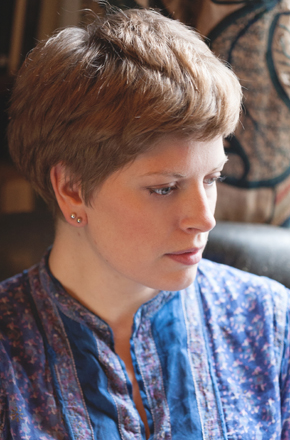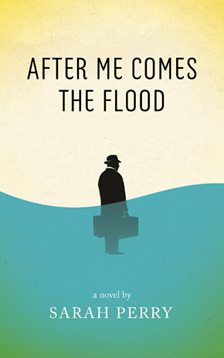Lightning strikes
by Sarah PerryI don’t remember a time when I was not spinning tales of one kind or another. In long arduous sermons I’d cover my notebook in handwriting so cramped I never knew later who or what I’d conjured up; and lying in my bunk bed with my sister restless above me I’d be commanded to tell stories until she slept. On car journeys I’d spy birds dead on grass verges or lorry drivers weary at the wheel, and go off into reveries from which I struggled to come back. To this day – despite doing my best to be a truthful sort – I’ll catch myself in some anecdote and never be quite sure what is fact, and what embellishment for the sake of narrative suspense.
But if asked what I wanted to do when I grew up, I rarely said, “write.” I said, “I’m going to be a neurosurgeon” or “I think I’d like to operate a wrecking ball.” The stories unspooling in my head almost never made it to paper. Once I’d outgrown a fad for knocking up books out of scraps and my mother’s embroidery thread, attempts at writing were scarce and soon abandoned. There was a story about vampires and broken light bulbs in year seven, and a few pages of sentimental tripe that had something to do with a magnolia tree, but little else. That I wanted to write was something inner and constant and rather painful – a little like a mild headache I complained about but didn’t really want to cure – but I did nothing about it.
Leaving university I joined the Civil Service, turning out to be hopeless at everything except writing. I couldn’t strategise my way home, and pity the souls abandoned to my ‘management’, but there was not one aspect of the pernickety, precise, prescriptive skill of government drafting I didn’t adore. Every briefing, speech, ministerial letter and set of minutes delighted me (if not my seniors): new phrases and forms, absurd neologisms, endless acronyms – they were words, and they did as I told them, and I loved them for it.
But all the while I was troubled, in the way one is troubled by the sensation that a set of keys has been misplaced, or a date overlooked. There was something I ought to be doing, and not doing it was making me miserable. All my unwritten stories were driving me mad, in particular the spectre – dim, far-off, but very definitely coming towards me – of a lonely man feeling his way hopelessly through a houseful of strangers. At that time I must’ve been a little like the Ancient Mariner, subjecting friends to the plot of a novel I had neither the confidence nor the discipline to write. In time – confidence bolstered (if extremely surprised) by having won the Shiva Naipaul Memorial Prize for travel writing – I enrolled in the Creative Writing MA course at Royal Holloway, where Andrew Motion was tutor. I had no portfolio of fiction to show – only my travel essay, and the haunting of the man who’d eventually become John Cole in After Me Comes the Flood.
It turned out I hadn’t a notion what I was doing. My almost complete inexperience in writing fiction showed painfully in comparison to classmates whose talent frightened me. Having at least once dashed onto Gower Street after a tutorial to weep silently over a Silk Cut, I abandoned the novel in order to write a series of stories by way of practice. I thought I’d treat them as exercises, thinking of them as the études and arpeggios musicians must learn if they’re to take on a concerto (writers knowing the impossible precision of the form will be outraged at my naiveté).
The MA ended, with none of the glory even the humblest student hopes for secretly in the small hours – and no book. I could put a sentence together, and if I described something you’d have a pretty sound idea what it looked like, and I rarely outraged the rules of grammar, but these are tricks of a trade: they do not make a novel. I had a cloth ear for dialogue, my plotting was ramshackle and my descriptions too lengthy, and I’d taken the principle of ‘show, don’t tell’ to so extravagant an extreme the reader had no chance of knowing what was going on.
Meanwhile John Cole drew nearer and nearer – I knew precisely the shape of his hands and the halting sound of his voice; I knew the pain of his loneliness; I’d felt his confusion. I also knew it was useless to expect to suddenly acquire the self-discipline I’d lacked for 27 years. There was nothing for it: I’d have to do a PhD. The kindness of Royal Holloway in giving me a studentship, and the patience of Andrew Motion as he supervised my work, are things for which I’ll always be thankful. I emerged – blinking, unhealthy and tired – five years later, having learned that to write a novel takes as much humility as passion, and more work than dreaming, and that sometimes lying in the bath reading Sebald is the only cure for failing to finish a paragraph. The novel was redrafted five times at least. I do not mean that I made changes to a document: I mean that I printed it out, laid it beside the laptop, and rewrote it from scratch. With every year that passed I saw more, knew more, read more – and so I understood more clearly what I lacked as a writer, and despised my manuscript more heartily.
But eventually it would have to make its way into the world, and so I sent it – with no hope of response – to three agents, one of whom responded so swiftly that for about ten minutes I decided I was almost certainly a genius who’d be a millionaire within the year. That agent was Hannah Westland at RCW, and from our first meeting I knew that by a stroke of luck rare as a lightning-strike I’d found someone who not only knew what I wanted to do, but how to make sure I could do it. Writers who’ve not yet worked with an editor may not know how magical the process is, at its best: it’s as if you’ve been speaking in a room full of strangers and no-one has heard, then suddenly someone appears at your side and says “Yes! I understand! I understand completely!” Under her guidance the book was punished and consoled and tightened until it was the best it had been – and then rejected, with all the exquisite slowness of a tooth extraction, by every publisher who saw it.
I grew ill with misery. One friend enjoys recalling the sight of my wandering pale as wallpaper paste along Regent’s Canal, demented with unhappiness, convinced I had no purpose in life. I simply had not realised how much my idea of myself as a writer was fundamental to my wellbeing: even through those years of never trying to write, I must somehow have felt it would eventually come to pass. “I feel”, I said, melodramatic as ever, “As if I have no place in the world. My feet don’t touch the earth. I have lost my shadow!”
Hardly a day passes when I don’t look on this extraordinary twist of fortune with grateful bafflement, and I tell any despondent writer I meet to hang on, teeth gritted, and wait for a kindly storm.”
Lightning strikes just the once, they say, but I’ve been blasted twice; Hannah Westland moved to be publisher at Serpent’s Tail and bought my book, leaving me in the care of another RCW agent who also saw from our first meeting what I was trying to do. Hardly a day passes when I don’t look on this extraordinary twist of fortune with grateful bafflement, and I tell any despondent writer I meet to hang on, teeth gritted, and wait for a kindly storm.
I cannot say I from that moment sailed contentedly on, navigating peaceful waters until the book was launched. Right up to the moment I woke on publication day to find the Guardian’s extraordinarily kind review scrolling up my Twitter feed, I was convinced I’d be unsold, ignored, despised and rejected. “I’ll just have to be a bloody barrister,” I’d say, like a child threatening to run away from home.
It’s early days yet, and still I’m stunned to see the book on shops’ shelves, or receive emails from readers. Gratitude is what I feel most of all: that I told a story, and people listened. Sometimes I think the impulse to tell a tale is the oldest human instinct that is not purely for survival, and imagine I’m sitting with friends by a fire in the black mouth of a cave, keeping winter at bay with my tall tales, and it makes me happier than anything else has ever done.
My only regret is that John Cole has gone. Walking through a car park recently I paused and felt him depart, and could have wept. I don’t care one jot how absurd this sounds, because it is true. He’d been with me a decade, and now he’s wandered away into other houses, leaving me as lonely as once he was.
The only solution, of course, is to write another book.
Sarah Perry was born in Essex in 1979, and grew up in a deeply religious home. Kept apart from contemporary culture, she spent her childhood immersed in classic literature, Victorian hymns and the King James Bible. She lives in Norwich. After Me Comes the Flood is published by Serpent’s Tail. Read more.
Follow Sarah on Twitter: @sarahgperry



